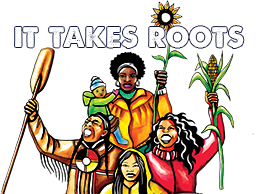This November, It Takes Roots sends a U.S. frontline delegation of over 60 people from communities most impacted by the climate crisis to the 26th Conference of the Parties (COP26), the United Nations global climate change conference. They’ll bring the voices and leadership of frontline communities and workers to the global stage, demanding world leaders commit to real solutions that advance climate justice, environmental justice, and a Just Transition off of fossil fuels in international climate negotiations.
As representatives of more than 200 organizations and affiliates in over 50 states, provinces, territories and Native lands on Turtle Island (known as North America), this delegation demands that the U.S. immediately stop fossil-fuel expansion, declare a climate emergency, and invest in community-driven climate solutions. It rejects the framework of “Net Zero,” a loophole promoted by fossil fuel corporations that leverages carbon trading and offsetting to allow continued fossil fuel extraction, production, and combustion.
Frontline communities including Indigenous Peoples, Black, Latinx, Asian Pacific Islander, poor white communities, and those in “sacrifice zones” bear the disproportionate burden of continued pollution. This delegation demands real solutions to the climate crisis including investment in a feminist Just Transition, a Red, Black, and Green New Deal to uphold Black lives, respect for Indigenous sovereignty, demilitarization and an end to resource wars, and grassroots solutions as outlined in the People’e Orientation to a Regenerative Economy.
As frontline communities suffer the intensifying widespread impacts of climate chaos, frontline leaders demand an end to government collusion with fossil fuels and false solutions that allow continued pollution. Reversing the climate crisis will require reducing emissions at their source, investing in community-controlled solutions, and a just and equitable economic transition off of fossil fuels that leaves no one behind.
“I am attending the COP26 to represent New Mexico and to tell our world leaders that we are not a sacrifice zone. Our land and water must be protected as well as the rights of future nuevomexicanx generations. We need to hold the U.S. military accountable in this climate conversation no matter how much power they hold in our state.”
- Alejandría M. Lyons, Environmental Justice Organizer, SouthWest Organizing Project (SWOP), Albuquerque, New Mexico
“I look forward to attending COP26 as an Indigenous woman from the U.S. territories in the Pacific. With the increasing militarization of the Pacific region and the climate crisis at our shorelines, we must join our allies to amplify our voices and unify on climate solutions.”
- Sheila Babauta, Northern Mariana Islands, Climate Justice Weaver, Micronesia Climate Change Alliance
“I am going to COP26 to help build a regenerative future based on the real solutions being innovated and advanced by indigenous and oppressed peoples all over the world. And to fight against the corporate capture of this essential process aimed at trying to preserve the capitalist system.”
- Kali Akuno, Executive Director, Cooperation Jackson
“The opportunity to stand with and learn from others also facing the double-edged sword of working towards a sustainable climate without the loss of quality jobs is very important; reaching a global solution to impending job loss is inseparable from a global solution for our climate crisis.”
- Norman Rogers, second vice president of United Steelworkers 675
“Solutions to the climate crisis must come from those communities most directly impacted. At COP26, the orientation of the international community must come from them not economists, corporations and politicians who created the crisis in the first place. Solutions can’t be about us without us.”
- Ozawa Bineshi Albert, Co-Executive Director of the Climate Justice Alliance
“I am going to COP 26 to not only let my voice be heard on the international level. But to let those in the decision-making seats know that I am demanding a clean future not only for myself but for my great great-grandchildren. We will not stand for false solutions. Indigenous knowledge knows how to heal the land and our voices must be centered.”
- Joseph White Eyes, Cheyenne River Grassroots Collective
